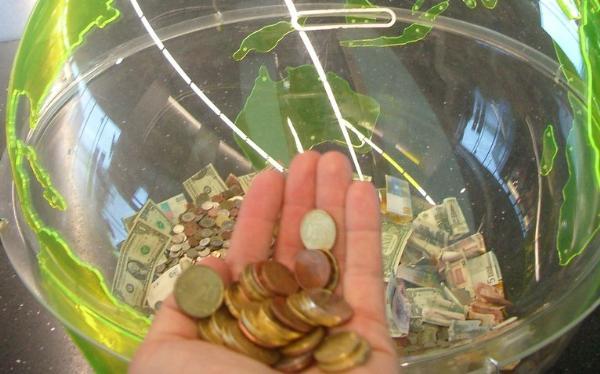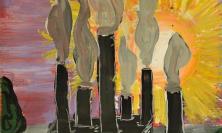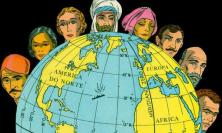Today marks the anniversary of Black Tuesday, a crucial date on the timeline of the 1929 Wall Street Crash, and in similar times of financial uncertainty our attitudes towards the economy are under the spotlight. Makbul Rahim describes how religious ethics can inform economic pursuits, asking particularly how a religious perspective might view the economy as a tool for tackling climate change.
It is only in very recent times that our society’s moral systems and ethics as a whole have been keenly challenged by deep and serious questions about the environment. The extent of the possible damage that human beings can cause to the environment and the natural world today has been exponentially enhanced by ultra modern technology which has provided individuals, peoples and nations with extraordinary tools, processes and capacities for impacting on, affecting and damaging the environment that were not even imaginable in the past. This has led to the need for modern society to re-examine our moral and ethical views on the environment and also the economic activities that adversely impact on the environment.
In the modern economy and the business world, faith and religious ethics generally are often regarded as being of only marginal relevance. For those considering business transactions and activities, the primary factors and drivers are profit maximisation, market efficiency, maximization of shareholder value and the capital asset pricing model. Economic activities are seen as essential bread-and-butter matters – sources of one’s livelihood – with faith and religious ethics as leisure or part time activities for society and its members. In other words faith is not seen as an integral part of economics or business life. The emergence of investor protection and transparency and good corporate governance in the business world has not come about voluntarily out of faith considerations. Rather it has had to be imposed upon it by law and other means and is more related to sustainability of the confidence which drives and maintains the economy. Religious ethics, on the other hand, emphasise factors such as human flourishing, the good of society and human happiness, the nature of the human person, the demands of community and solidarity. These are not considered as critical drivers or important determinants by market players in the economy.
In this paper we will discuss how a religious perspective might view the economy as a tool for tackling climate change. The primary focus will be on Islamic faith, though examples from Christianity and Judaism, the other two Abrahamic faiths, will be used. There are two aspects which need to be considered in this respect. Firstly, the interaction and relationship between faith and the economy and, secondly, the relationship and impact of the economy on the environment.
Clearly religious ethics cannot go beyond its specific competence (for example, by providing detailed economic plans). What it can do, however, is ask different sorts of questions so as to arrive at guidelines to influence various economic activities taking place in society. The first question concerns the purpose of the economy. It is necessary to ask what is/are the good(s), and the ultimate good, for the sake of which the purposes of business might be pursued? How does business contribute to the purpose of the economy? What is the relationship between economic activity and the wider society?
The moral justification of the market can only lie in the nature of its object, that is, the purpose of the economy. Equitable arrangements for the production and generation of wealth and its fair distribution to all the needy in the global society are critical factors in the moral justification of the economy and its activities. The UN millennium goals also highlight the basic rationale of the ultimate good of the world society as a key objective of all our endeavours. In the end one is asking: How does this activity contribute to the ultimate good of human life? What we have here is a clear assertion that the economy has a purely instrumental function; it is a means to an end. It is not an end in itself. This was clearly articulated in Gaudium et spes, the Pastoral Constitution on the Church in the Modern World promulgated by His Holiness, Pope Paul VI on 7 December 1965.[1]
The ultimate and basic purpose of economic production does not consist in the increase of goods produced, nor in profit, nor in prestige; it is directed to the service of man, that is of man in his totality, taking into account his material needs and the requirements of his intellectual, moral, spiritual and religious life. Economic activity is to be carried out according to its own methods and laws, within the limits of the moral order, so that God’s design for mankind may be fulfilled.[2] The common good does not subscribe to a reductionist anthropology which sees the human person as no more than homo economicus, or to a view of society which, by absolutising the market, diminishes society to an adjunct of it. The market, as only one aspect and one dimension of human activity, is not to be absolutised. Neither should the consumption of goods or pursuit of profits be society’s only value. What religious ethics could contribute to business ethics at this point is the provision of a theoretical justification for denying validity to the claim that business should be allowed to act unhindered by political and social constraints.
In responding to climate change and related environmental issues the primary drivers of behavioural change in modern society have, so far, been guilt and fear: guilt over one’s greed and excessive consumption, and fear of the drastic consequences of environmental degradation on one’s own life. What religious ethics can do is to provide a sustainable motivation which is connected with positive values, already deeply held, and which can be embodied in the life of believers.
Faith traditions and perspectives
Let us now examine the key concepts and perspectives rooted in Islamic faith that may be considered in addressing environment issues and concerns.
We will start with the implications of the basic fundamental principle of Tawhid – oneness of Allah. God is the Ever Living Eternal God, the one absolute creator of all creation and He brings into existence creation from non-existence. His act of creation has a definite purpose, and humanity and the universe and all in it are a part of the creation of God to fulfil the purpose of creation. This is to worship God through living life on earth in accordance with His guidance. Ownership of all things is with Allah, the Creator and Sustainer.
Many of the Islamic traditions and values are shared by the other two Abrahamic faiths. All three traditions start from a common acknowledgement of our place in the natural order: creation bows before God, not before us, and human beings must do that which God commands. A correct relationship with the wider creation is a religious responsibility. Our relationship with wider creation might be understood as one of trusteeship in the case of Islam, stewardship in the case of Christianity, and, for Judaism, one which involves working the land – making demands of it – as well as looking after it.
In Islam, every human being is unique in the sight of God but to understand fully the significance of the human being, it must be seen in context. Islam says ‘you are not the centre – you are a channel of grace – you alone do not matter’. Everything belongs to God, everything in the world sings to God’s praise. There is, nonetheless, something that is unique to me and this implies rights. Attention to the environment sits within a recognition of rights and an overarching sense of responsibility. It is in this context that Muslims are enjoined to avoid waste and to recognise a duty to the future.
Christianity and Judaism share the belief that ‘what I do matters’ because ‘I matter’ infinitely to God. Moreover, the Jewish consciousness of living as a stranger in the land and the Christian consciousness of being a pilgrim people lead both traditions to an understanding that we are guests on the earth, with associated notions of hospitality and respect. While Christians describe themselves as stewards of creation, Judaism sees human beings as God’s partners in the repair of the world, and considers that, as such, what each does has cosmic significance.
Then there is the principle of responsibility of human beings. Humanity is responsible to God for all their actions and deeds. Humans are accountable for their trust and actions and deeds. Humans have been given the highest status among all God’s creation as the best of all creation (ashraful makhluqaat). They also have been given the responsibility of stewardship and trust (amaanat) by God to care for and be a conduit of blessings of Allah for all creation. Humans are invested with special status and responsibility as trustees on earth.
The notion of human responsibility in relation to human capacity has changed over time. From being limited by the fragility of natural life and an imperilled relationship with the natural world, it expanded in the late eighteenth and nineteenth centuries due to the optimism generated by the notion of an age of ‘progress’ Today humanity is again confronted by an imperilled, fragile world – this time due to our own huge capacity for destruction.
The balance and natural order in the universe created by Allah must be preserved. The environment is not only for the present generation but is Allah’s bounty (Niyamat) for all ages past, present and future. The preservation of environment is one of the basic duties of Islam.
We have permission to utilise but not to waste the environment and resources of the universe. There is also the concept of thanking Allah, or being grateful to Him (shukr). Thanking Allah means protecting and preserving Allah’s bounties and favours to mankind on earth. Therefore to use natural resources without regard to the environment is ingratitude to Allah. There has to be respect for the signs of God. The universe and all its wonders, discovered and undiscovered to date, are worthy of respect as signs of God. In praying in the present, a Muslim remembers God and, through Ibadah, spiritual elevation, shapes his or her future. Prayer involves, first of all, awareness – in admission and contrition – of our past and our present. First we repent, and then we pray for the future. By praying, believers set a direction for the future, becoming tuned in to the Divine plan.
There is then the concept of doing wrong to oneself, which is classified as injustice (dhulm). Self-destructive and self-seeking materialistic activities in the exploitation of natural resources which recklessly pollute and despoil the natural environment and its natural resources constitute dhulm to one’s self and others – for which one is accountable.
Islam shares the concept of the ‘end of time’ with Christianity and Judaism, but there are two different understandings of its time-frame. The first sees it as the whole Islamic era, and the second as just the end-point, the period immediately before the resurrection. The ‘end of time’ is characterised by widespread religious, moral and social problems, compounded by irresponsibility on the part of the powerful, but also by the ‘best believers’ in history. Quantitively, evil will be in the ascendancy; qualitatively, good will be. At the same time, the responsibility of Muslims towards creation is not affected by dangers or threats. The Qur’an says that all have a responsibility to improve the earth and to leave the world a better place for future generations. Even if their efforts appear to have no effect, they still have a duty to avoid waste and to do what they can to bring about improvement. This process is about intention, coupled with the best available knowledge and experience.
There is also the concept of corruption or Fasaad. Allah has condemned disorders, disharmony and unjust use in which plants, animals and natural resources are destroyed. In relation to the disorder of the environment, the real problem is not the subduing of the heavens and the earth but the immoderation, unlawful control and excessive, rash and haphazard utilisation of earthly resources without caring for the environment and causing disintegration of the system of the environment, harm to human life, and disorder and mischief. All of these concepts call into question the often unthinking ways in which we value and treat the environment, ways which are often seen in our attitudes about the economy.
Then, there is the concept of the hereafter. The two important implications of that for the environment are that, firstly, one should live in a manner which is as simple as possible within the era in which one lives. Since this earth is a way station, the traveller should live with simplicity in the temporal home and not be lavish and extravagant in the consumption of material and physical objects and all the bounties of the natural environment. We must at the same time pay attention to the earth and make our best efforts to nurture and conserve the environment. Secondly, one must return the keys of this temporal residence to the real owner when we check out of this world, having fulfilled all the obligations of a tenant of God and having complied with the rules made by God for using the earth and all its bounties.
The natural environment is intrinsically valuable because it constitutes the signs of God and God’s manifestation through the sun, stars, moon and all the things in the universe. It is valuable because it plays an important part in the perfection of human beings. The signs of Allah are a manifestation of the divine attributes and names, and enable mankind to witness to the glory and majesty of God and remind us of God’s presence in creation and the Day of Judgement. The natural environment provides human beings with a means to achieve the goal of closeness to God by the discharge and fulfilment, in the manner taught by God, of the duties and responsibilities of its proper utilisation and conservation. It is important to note that Islam does not forbid the utilisation of the resources of the environment. What it does forbid is that this utilisation be undertaken without regard for its deeper meaning for human life.
Using Aristotle’s terminology the environment, and that includes the economy, constitutes the external goods for salvation while the internal goods are the good qualities of our souls. The first holy Shi’a Imam Ali (a.s.) says that God will question you in regard to the permitted uses of the earthly goods and will punish you as regards the forbidden uses of the earthly goods. Some traditions do provide good role models, such as Imams who earn wealth and give it away, or use it to help others earn a living, but then why is this issue not more prominent in the congregation? Why are we so dominated by consumerism, even though other principles are part of our core beliefs?
What motivates a fractured society to go without for the sake of others? It is possible that it is only from a religious perspective that these questions can be asked about the economy without simply becoming a route to despair. Using the principles that have been outlined here, it is possible to envisage answers which illustrate the compatibility of wise economic activity with human flourishing and fulfilment. Islam does not condemn economic activity, but it does put it into a wider and deeper framework. Like the other two traditions, it sees that economic activity is necessary, but it does not see it as the dominant feature of our life. It is something which should be of service to virtuous and pious living, not an end in itself. Therefore, while economic activity is a necessary condition, it is not a sufficient condition for living the good life.
How can the faith traditions be used in tackling environment issues?
Arguably, ‘conspicuous consumption’, has been replaced as a signal of status these days by ‘competitive’ consumption, relative to and compared with the ‘top’ 20% of the population, and signalling a set of values which conflict with simplicity, moderation, or the idea of having ‘enough’. Be that as it may, the Qur’an tells us that we eat and drink what God has provided. Wealth is a bounty from God, who gives different bounties to different people. Wealth, however, brings responsibilities. The wealthy man must be conscious of the claims others have on him. Consumption as a status symbol is wrong – decisions should be made on the basis of need (although this will always be a subjective view), and one should not put others to shame. At the end of each year, Shi’a believers are expected to give 20% of any extra money to the religious authorities – and the definition of ‘extra’ includes spending not appropriate to one’s need. Islam challenges economic poverty, but does not condemn poor people. Poverty is not a sign of God’s anger, and neither is wealth a sign of God’s approval. The generation of wealth is a positive thing, but among the four questions believers will be asked when they die are ‘Where did your money come from?’ and ‘Where was it spent?’
In the Catholic tradition, Religious (i.e. monks and nuns) are called on particularly to witness to the beauty of a simple lifestyle. All traditions have this element, but we are all guilty of excessive consumption – why? Perhaps because the culture in which we live depends on our consumption. In Europe, we have to take note, too, of a particular difficulty encountered by Christianity, which has played a significant part in the development of that culture and finds it hard to disentangle its values.
Islam defines a clear economic system; Christianity has economic principles (e.g. wealth for the alleviation of poverty; just distribution of goods; a just wage, just price etc); Scripture defines a set of values, not a system. Catholics would add that any economic system can be good or evil; what is important is the values which are brought to bear. Despite these differences, the market economy may be seen as the fault-line between religion and society. It is essential to see it as instrumental, not an end in itself. This is one of our most fundamental battles, but people of faith should not see themselves as its victims. They can influence it by being part of it, by directing their consumption, and by supporting businessmen who try to integrate faith and professional life.
Conclusion
For Islam, the God-centred nature of creation is the root of responsibility to the future. Accountability to God makes humanity look to the future and aspire to development and to the achievement of a repaired and reformed society. Essential to this process are education, awareness and sensitivity. All three faiths offer people ‘way stations’ to look at their life and access greater wisdom about how to live it, but it is a struggle to transmit this consciousness to all. Religion is too commonly perceived by secular culture to be ‘pie in the sky when you die’ – an acceptance of suffering in the hope of future elevation – instead of an immersion in the depth and mystery of the here and now, the reality of which is revealed by the prophetic vision, centred on God, not on ‘me’.
When it comes to communicating our vision to others, maybe we should get out of the ‘religious box’; we all live in a plurality of worlds and in speaking to today’s culture ours should be a language of empowerment. Our traditions all emphasise the extent to which we each create the future because of decisions we make now. They live out a constant process of commitment, but we rarely express this as commitment to the future. In speaking of the future we are able to use the language of love, mercy and grace, rather than fear.
From a faith perspective, our objective would be to promote the acceptance of religious ethics as an integral factor to be considered in the pursuit of economic activity, alongside the technical and economic factors and other considerations which determine the form and nature not only of individual activities but the economic activities undertaken by society at large. From a faith perspective, this would mean taking account of fair distribution of wealth in society; the impact of economic activities and operations (such as hydro projects or the extraction or exploitation of natural resources) on poor and vulnerable people and on land and water resources; justice in economic relations between producers and consumers and other stakeholders; and fairness of access to, and pricing of, goods, services and technology transfers from developed to developing world. It would demand the development of an ethical blueprint to guide all economic activities, including production, marketing, distribution and consumption of wealth and goods and services, encouragement of ethical business and economic activities and practices, good corporate governance for business and society at large. These are not small matters, and they demonstrate that religion – rather than being something to be relegated to the private sphere – is at the heart of how we organise our common life.
Makbul Rahim is a lawyer and legal consultant specialising in legal and policy aspects of natural resources development, promotion of private investment and capital markets development in developing countries. He has worked extensively in these areas in the Commonwealth Secretariat, a UK based multilateral developmental international organisation. He has also served as part time principal of and teacher at a Shi’a Islamic educational institute in London. He lectures on various aspects of Islamic faith and traditions and participates extensively in interfaith activities.
This article is part of a series, Faiths in Creation, published earlier this year by the Heythrop Institute for Religion, Ethics and Public Life,IBN 978-1-905566-07-5. It is available as a booklet from HIREPL, Heythrop College, Kensington Square, London W8 5HQ, at £4 per copy.
[1] Second Vatican Council Gaudium et spes (London, Catholic Truth Society, 2001).
[2] Gaudium et Spes, paragraph 64.






